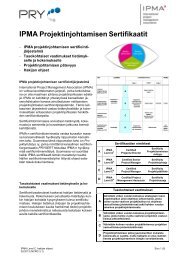Boundary activities and readiness for ... - Projekti-Instituutti
Boundary activities and readiness for ... - Projekti-Instituutti
Boundary activities and readiness for ... - Projekti-Instituutti
You also want an ePaper? Increase the reach of your titles
YUMPU automatically turns print PDFs into web optimized ePapers that Google loves.
Results<br />
that many key managers were stuck with rationalizing about the program<br />
concept. The following quote illustrates this observation:<br />
Q88 (Center, program core team member): “I think it’s very important that we<br />
have these discussions in our organization about what we mean by a program.<br />
I have perceived that some talk about this program as just a project,<br />
downplaying its importance. And some say that this topic just requires some<br />
minor coordination. With these presumptions the risks are very high, since this<br />
is so much more than just a project or just minor coordination.”<br />
Especially Center’s unit managers, representing the line management, felt<br />
that the most important issue in program initiation was to clarify the role of<br />
programs in Center’s overall management system. It seemed that a lot of<br />
energy was put into this sensemaking, instead of trans<strong>for</strong>ming the initial<br />
program goals into plans <strong>and</strong> <strong>activities</strong> <strong>and</strong> in this way advancing the case<br />
program. Some of Center’s line managers actually seemed to drive their<br />
own agenda by protecting their personal status <strong>and</strong> opposing the program<br />
that might change the prevailing power relations. It was also clear that<br />
central managers in Center did not have a shared underst<strong>and</strong>ing of what it<br />
takes to implement large-scale change in a program <strong>for</strong>m. The following<br />
quote shows how one active program participant concluded the situation:<br />
Q89 (Center, program core team member): “I have reached the conclusion that<br />
we as an organization have not developed far enough to implement programs.<br />
We have been able to develop the way we run individual projects, but now the<br />
challenge is to move to the program level.”<br />
In case Bureau, there was a longer tradition of internal change projects,<br />
but not much experience from large-scale change ef<strong>for</strong>ts. Similarly as in<br />
Center, programs were viewed to require a novel approach. However,<br />
instead of arguing about the role of programs in the wider management<br />
system (as in Center), Bureau’s key managers were committed to take the<br />
program further as rapidly as possible. There was still discussion about the<br />
special nature of programs <strong>and</strong> its implications <strong>for</strong> program management.<br />
As an example of these sensemaking ef<strong>for</strong>ts, the program manager<br />
presented the following analogy:<br />
Q90 (Bureau, program manager): “The nature of programs is such that you<br />
select a path based on what seems to be the most promising to help you achieve<br />
your goals. The goals are not clear, but they are rather fuzzy. When you have<br />
selected your path, at each intersection you need to make a new choice. Little by<br />
little you define your target as you walk the path.”<br />
Bureau’s organization was characterized as slow to change, <strong>and</strong> the<br />
managers of the program initiation had realized that to make change<br />
171









